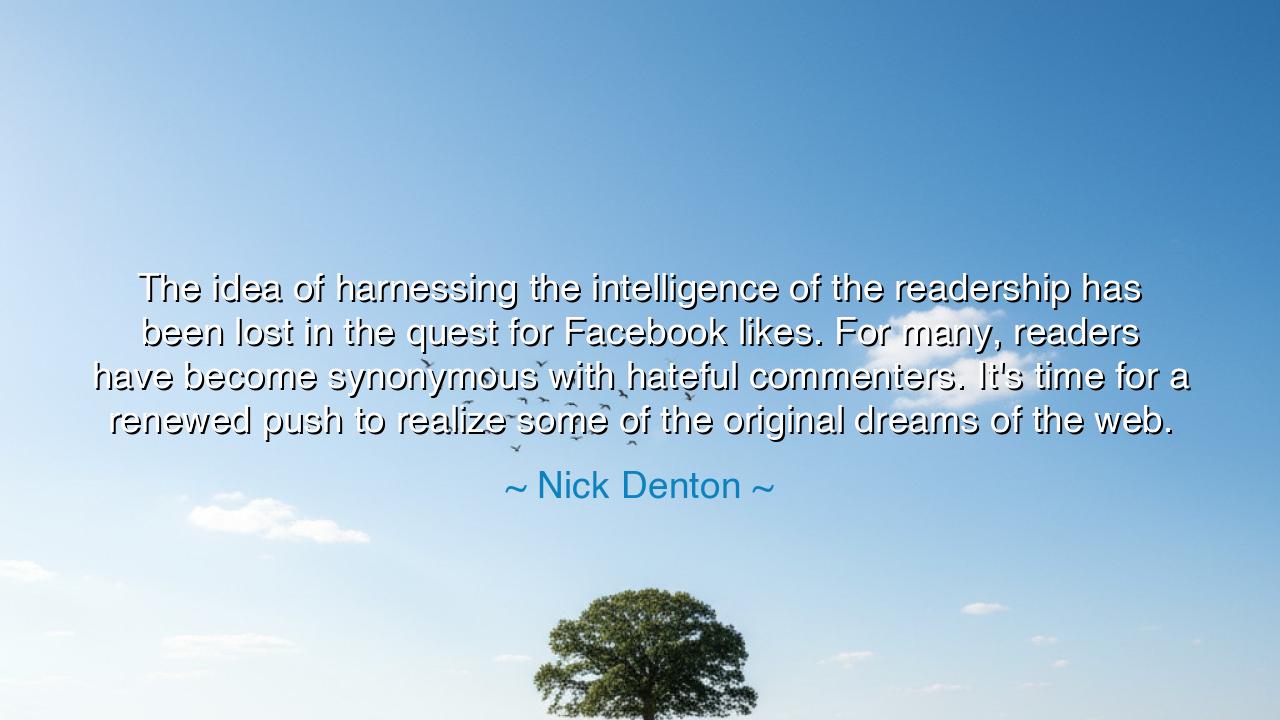
The idea of harnessing the intelligence of the readership has
The idea of harnessing the intelligence of the readership has been lost in the quest for Facebook likes. For many, readers have become synonymous with hateful commenters. It's time for a renewed push to realize some of the original dreams of the web.






The words of Nick Denton, founder of Gawker and pioneer of the digital age, strike like a bell tolling for a world that has lost its way: “The idea of harnessing the intelligence of the readership has been lost in the quest for Facebook likes. For many, readers have become synonymous with hateful commenters. It’s time for a renewed push to realize some of the original dreams of the web.” In these words, there echoes both mourning and hope — a lament for what the internet once aspired to be, and a call to restore its forgotten purpose. Denton’s voice is that of a builder dismayed at what his creation has become: a network that once promised shared intelligence and understanding, now consumed by vanity, division, and the hunger for fleeting approval.
When he speaks of “harnessing the intelligence of the readership,” he reminds us of the early visionaries of the web — those who saw it not as a marketplace of distraction, but as a forum for the meeting of minds. In those first, idealistic days, the internet was imagined as a vast agora, where the wisdom of millions could be shared freely, where each reader was not a consumer but a participant, a co-creator of knowledge. It was a place of discussion, discovery, and connection. But with time, as Denton laments, this golden dream gave way to a new god — the god of likes, of metrics, of the shallow currency of attention. The flame of understanding was replaced by the glare of the algorithm.
In his words we hear an ancient warning, one that echoes through all ages: when truth becomes less important than approval, the mind of a people begins to dim. The Athenians once prided themselves on discourse and debate, yet even they fell to the seduction of applause. Socrates, the wisest of their number, was condemned not because he was wrong, but because he made them uncomfortable. The same pattern unfolds again — the mob, whether in the marketplace or on social media, rewards what flatters and punishes what challenges. Thus, wisdom is drowned by noise, and the voices that would enlighten us are silenced by the clamor for likes.
Denton’s lament is not bitterness alone; it is also a summons. He calls for a “renewed push to realize some of the original dreams of the web” — to reclaim the soul of digital discourse. The web, he reminds us, was born of curiosity, not competition; of collaboration, not contempt. Its founders dreamed of a connected humanity, where ideas could flow freely, and where the collective intelligence of humankind could be awakened and harnessed for good. But this dream requires effort — it demands that we look beyond the glitter of the new and return to the discipline of thought, of dialogue, of listening.
We see this lesson written clearly in the history of all great inventions. When Gutenberg brought forth the printing press, it too unleashed both enlightenment and chaos. His machine gave voice to truth but also to rumor and propaganda. It took centuries for humanity to learn to wield that power wisely. The same is true now. The web is our new printing press — a vast, ungoverned ocean of words — and like all tools, it reveals not only our genius but our weaknesses. Denton’s words remind us that progress without principle leads not to light, but to confusion.
So what must we learn from this? That the power of the written word — whether on papyrus, parchment, or screen — must be used with reverence. Each post, each comment, each shared thought carries the weight of consequence. To “harness the intelligence of the readership” is to believe again in the nobility of conversation, to treat readers not as enemies or numbers, but as fellow travelers in the search for truth. It means choosing depth over reaction, empathy over outrage, dialogue over mockery.
And thus, the lesson is this: do not surrender your mind to the machinery of approval. Let your words be guided not by what will earn applause, but by what will awaken understanding. If you read, read with the intent to grow; if you write, write with the intent to build. Seek not likes, but meaning. For the web, like the mind of humankind, can either be a labyrinth of noise or a cathedral of knowledge. The choice, as Denton reminds us, lies not in the algorithm, but in us — in whether we dare to return to the original dream: a world where ideas unite, and intelligence, not vanity, lights the way forward.






AAdministratorAdministrator
Welcome, honored guests. Please leave a comment, we will respond soon